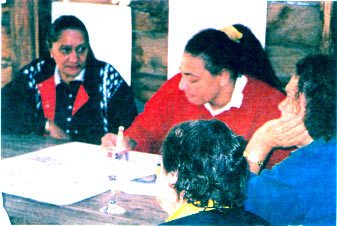|
The Role of Elders
The workshop agreed with the need for recognition of Elders and greater
emphasis on the status of Elders in the community. The role of Elders
as being the repositories of knowledge, of life accomplishments and the
source of cultural transmission must be acknowledged and upheld. There
must be acknowledgement of the separate but equal role of men and women,
each contributing to benefit the whole of the community with men as head
of the family, spiritual and cultural leaders and women as nurturers of
people, land and relationships. The Goulbourn Valley Aboriginal Elders
Group has maintained the role of women as nurturers of people with a focus
on health and emotional management. This is practised in the involvement
of Elders in the Goulbourn Valley Hospital Committee, the role of Elders
in providing emotional support at times of trauma and grief the in the
community and through involvement in the Woongi Spiritual Healing Program.
Relationships
Elders have a crucial role in strengthening the cultural and social position
of the community. This can be done through working within family groups
through family gatherings and organised activities that bring together
all family members of the family. There is a need for activities which
encourage interaction between Elders and youth to enable cultural transmission
and to foster mutual respect. Such activities would provide a valuable
means of conveying knowledge to youth of genealogy, language, stories
and traditions and provide opportunities for role modelling, mentoring
and developing youth leadership.

Elders discussed relationship with country. In this context ‘country’
means place of origin -literally, culturally and spiritually. Members
of the Goulbourn Valley Aboriginal Elders Group have demonstrated their
attachment to their country through providing evidence in the historic
Yorta Yorta Native Title Claim.
Elders from other tribal groups spoke of their deep attachment to their
tribal lands whilst respecting the country in which they now live.
There was unanimous agreement on the need to create awareness of tribal
boundaries and the unique rights of traditional owners. Consideration
must be given to people from other tribes who are connected to Yorta Yorta
through marriage and children. There are long term residents in Yorta
Yorta territories who have tribal connection with other country. These
individuals identify with their own tribal groups but have a ‘sense
of place’ through affiliation with Yorta Yorta people and land and
through participation in community activities. Nevertheless they respect
tribal boundaries and traditional ownership.

|
 |
